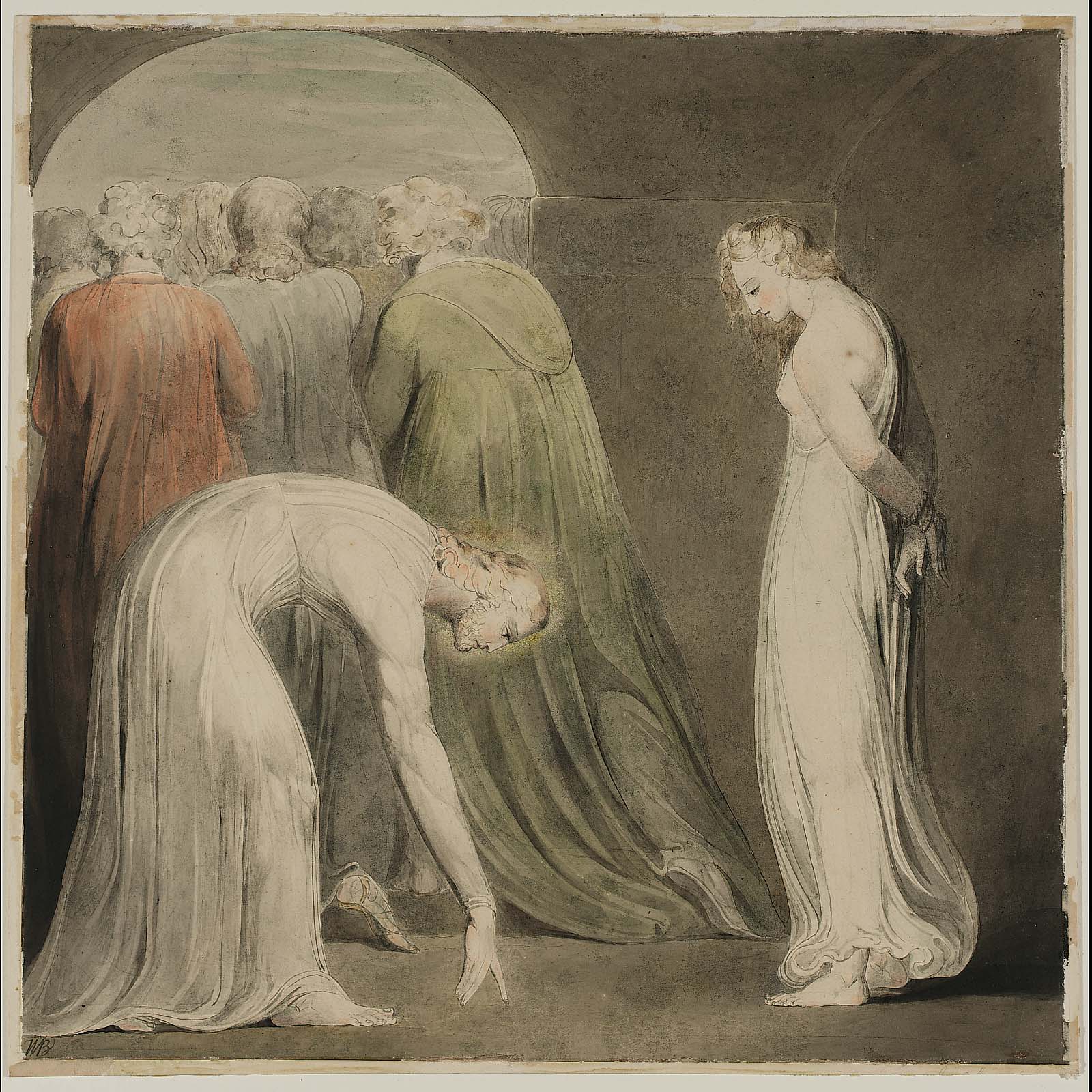.jpg/800px-Jerusalem_The_Emanation_of_The_Giant_Albion%2C_copy_E%2C_object_76_(Bentley_76%2C_Erdman_76%2C_Keynes_76).jpg) |
Wikisource Jerusalem Plate 76 |
Matthew 28
[16] Then the eleven disciples went away into Galilee, into a mountain where Jesus had appointed them.
[17] And when they saw him, they worshipped him: but some doubted.
[18] And Jesus came and spake unto them, saying, All power is given unto me in heaven and in earth.
[19] Go ye therefore, and teach all nations, baptizing them in the name of the Father, and of the Son, and of the Holy Ghost:
[20] Teaching them to observe all things whatsoever I have commanded you: and, lo, I am with you alway, even unto the end of the world. Amen.
In Jerusalem, Plate 62 Blake has informed us that we are participating in a visionary experience. It is not the time frame of the natural world but of the Eternal world. Although the incidents and characters exist in the physical world the action is in the Eternal dimension.
The conversation has gone from Mary to Joseph, then back to Mary with a new consciousness. Jerusalem enters to take up the passage through the world of Joy & Woe into which the infant Jesus was thrust. This final segment transfers our attention to the Eternal Jesus who in his Resurrected Body joins Jerusalem in her journey.
The passage is through the world of Luvah and Vala where the turmoil of the emotions is acted out in physical conflict and suffering. Although there is mental and physical pain to be endured, it need not be carried alone. Faith, Trust and Love will sustain those who rely not on 'individual perception' but who 'Die & pass the limits of possibility.'
The panoply which has been spread before us is witnessed by Los - the ability to perceive through Imagination. He has the ability to see beyond the destructive forces of Annihilation to the creative events of renewal.
Jerusalem, Plate 62, (E 213)
"Jesus replied. I am the Resurrection & the Life.
I Die & pass the limits of possibility, as it appears
To individual perception. Luvah must be Created
And Vala; for I cannot leave them in the gnawing Grave.
But will prepare a way for my banished-ones to return
Come now with me into the villages. walk thro all the cities.
Tho thou art taken to prison & judgment, starved in the streets
I will command the cloud to give thee food & the hard rock
To flow with milk & wine, tho thou seest me not a season
Even a long season & a hard journey & a howling wilderness!
Tho Valas cloud hide thee & Luvahs fires follow thee!
Only believe & trust in me, Lo. I am always with thee!
So spoke the Lamb of God while Luvahs Cloud reddening above
Burst forth in streams of blood upon the heavens & dark night
Involvd Jerusalem. & the Wheels of Albions Sons turnd hoarse
Over the Mountains & the fires blaz'd on Druid Altars
And the Sun set in Tyburns Brook where Victims howl & cry.
But Los beheld the Divine Vision among the flames of the Furnaces
Therefore he lived & breathed in hope. but his tears fell incessant
Because his Children were closd from him apart: & Enitharmon
Dividing in fierce pain: also the Vision of God was closd in clouds
Of Albions Spectres, that Los in despair oft sat, & often ponderd
On Death Eternal in fierce shudders upon the mountains of Albion
Walking: & in the vales in howlings fierce, then to his Anvils
Turning, anew began his labours, tho in terrible pains!"
.



